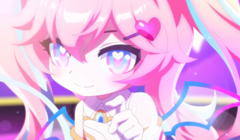In late-night solitude, Darim, a talented animator for South Korea's beloved video game, MapleStory, faced an unthinkable backlash after sharing a character trailer. Her excitement quickly turned into terror when the trailer prompted a deluge of online abuse, including death and rape threats. This vitriol was sparked by a frame depicting a female character seemingly making a hand gesture reminiscent of a controversial symbol associated with a feminist movement from years past, igniting fury among young male gamers.
"They sent me insults that were grotesque and vile," stated Darim, a pseudonym reflecting the animators’ wish to maintain privacy amidst the chaos. The response from her company, Nexon, was immediate; they retracted the promotion and distanced themselves from the controversy. Yet, the tide of ferocity only grew, with accusations hurled at her for assumed feminist leanings.
The online environment in South Korea has soured for women, particularly those in the gaming sector, as they become victims of intense witch hunts. Men in anti-feminist circles unleash torrents of abuse, attempting to expose, disgrace, and even terminate women suspected of harboring feminist sentiments. Minsung Kim, a male gamer disturbed by this trend, created a support organization to aid victims and challenge the rampant misogyny.
These backlash campaigns, increasingly organized and aggressive, have smeared the reputations—and sometimes the careers—of several women in the industry. When Darim's studio received threats for her alleged "feminism," the internal atmosphere became tense, prompting a swift reaction not only from her employer but from the gaming industry at large.
As the societal landscape shifts, the witch hunts foster a culture of fear, pushing many feminists to conceal their beliefs, aware of potential repercussions. Young men often feel threatened by the rising visibility of women advocating for change, leading to a toxic environment where any slight against male sensibilities is met with hostility.
Experiences like that of Jigu, who was violently attacked for her short hair—a perceived marker of feminist ideology—further illustrate this disturbing trend. After her harrowing assault, she even began to embrace the feminist label she once shunned. In her words, “I want to reach out to other victims like me.”
The callousness of these harassment campaigns has spurred conversations surrounding systemic gender discrimination in Korea, where the gender pay gap remains one of the highest among developed nations. Despite protests and efforts from feminist organizations, deeply rooted prejudices persist, bolstered by political rhetoric that dismisses women's rights advocacy.
As female empowerment is met with aggressive resistance, the need for legal protections against such discrimination becomes starkly evident. Activists consider that without a blanket anti-discrimination law, efforts to counteract sexist backlash will remain impotent against the growing tide of anti-feminist sentiment from a particularly vocal minority.
South Korea now finds itself standing at a crucial crossroads: will the outcry from women and their allies catalyze change and lead to a more inclusive society, or will entrenched misogyny continue to dictate the narrative for future generations?



















